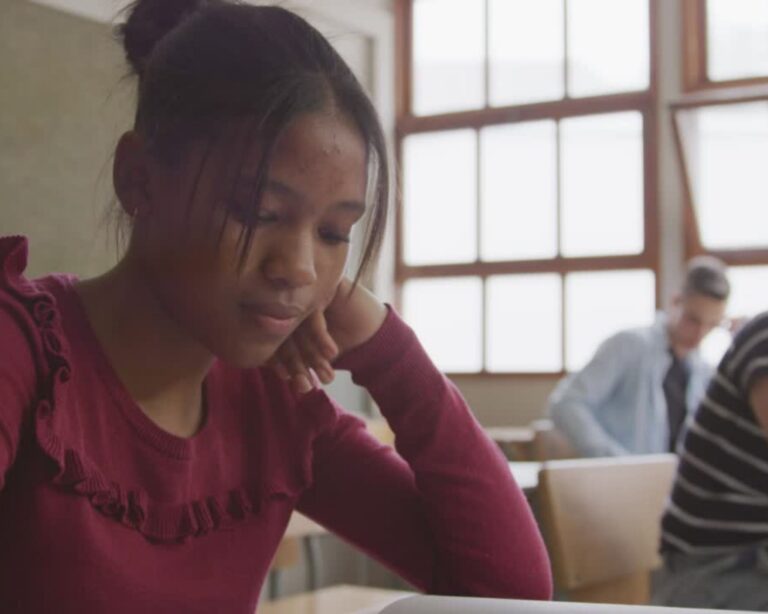Introduction

Education is considered a powerful tool for personal and national development, yet many students from low-income families face significant barriers to learning. In Ghana, where poverty levels remain high in many regions, students from underprivileged backgrounds struggle with challenges that often hinder their academic success. These difficulties range from limited access to educational resources to the emotional stress of financial instability. This article explores some of the major challenges faced by students from poor homes and suggests ways in which schools and communities can provide support.
Lack of Educational Resources
One of the primary difficulties students from poor homes encounter is the lack of essential learning materials. Many students struggle to obtain basic supplies like textbooks, notebooks, and even uniforms. Families with limited incomes often prioritize basic needs, such as food and shelter, over educational expenses, which leaves students at a disadvantage compared to their peers. Without access to resources like computers, the internet, and adequate books, students face a gap in learning and development that affects their overall academic performance.
Limited Access to Extra-Curricular Support
In addition to materials, students from low-income households may lack access to extra support, such as private tutoring or after-school programs, that can reinforce learning. This is especially challenging in subjects like mathematics and science, where extra support can make a significant difference. The inability to afford private lessons or tuition puts these students at a disadvantage, as they are unable to catch up on difficult concepts outside of class hours.
Financial Pressures and Emotional Stress
Poverty places immense stress on students who often feel the burden of their family’s financial struggles. Many students from poor homes worry about school fees and may have to contribute to household income through part-time work. This extra responsibility can result in a lack of time and energy for studying. The constant stress of financial insecurity also affects mental health, leading to anxiety, difficulty concentrating, and low motivation. The mental toll of poverty is a significant, though often overlooked, factor affecting academic performance.
Poor Nutrition and Health Challenges
Nutrition plays an essential role in learning, as a well-fed brain is more capable of focus and information retention. However, students from impoverished backgrounds may not receive adequate nutrition, which can lead to malnutrition and fatigue. Health problems stemming from poor diets or lack of healthcare further disrupt education, as students may be frequently absent from school due to illness. Poor health also affects a student’s ability to concentrate and actively engage in classroom activities, further impacting their academic success.
Social Stigma and Self-Esteem Issues
Many students from poor backgrounds face social stigma, as their peers may notice differences in clothing, school supplies, or even school transportation. This can lead to feelings of inadequacy and low self-esteem, which affect a student’s engagement and performance in school. Bullying or discrimination from peers over economic status can make students reluctant to participate actively in class or form friendships, further isolating them and creating an additional emotional burden.
Suggested Solutions
To support students from poor homes, schools, communities, and the government can take several steps:
- School Support Programs: Schools can provide scholarships, free lunch programs, and resource centers with books and learning materials for students who cannot afford them. Schools can also partner with local NGOs to offer free tutoring services or mentorship programs.
- Community Involvement: Community support can play a vital role in uplifting disadvantaged students. Community centers and libraries can offer free access to computers and the Internet. Local businesses can contribute to education by donating supplies or sponsoring students.
- Mental Health Support: Recognizing the mental and emotional impact of poverty, schools could provide counseling services to help students manage stress and build resilience. Programs that encourage positive self-esteem and foster supportive peer relationships are crucial.
- Government Intervention: The government should continue to expand free senior high school programs and other educational policies that reduce financial barriers to education. Greater investments in public libraries and free internet access points in underserved areas can also help bridge the gap.
Conclusion
The difficulties faced by students from poor homes in Ghana are multi-faceted and deeply impact their learning experiences. With the right support systems from schools, communities, and the government, these students can have a fairer chance at academic success. Education should be an equalizer, and with collective effort, we can create a society where every student, regardless of economic background, has the opportunity to learn, thrive, and achieve their dreams.






